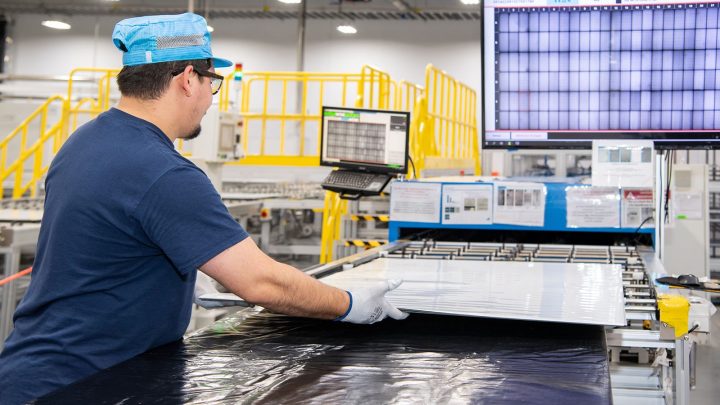
The clean energy revolution needs green workers, fast

New factories are going up all over the country — from Tucson to Pensacola to Rochester — to build electric vehicles, batteries, wind turbines and solar panels. It’s all part of the race to drastically cut greenhouse gas emissions to keep climate change in check. It will take millions of people to build, install, and maintain all that technology. For many of those workers, these are brand new careers. So they need training, fast.
In a warehouse near Savannah, Georgia, a series of long tables hold the innards of several car seats. At the start of the line is an unidentifiable collection of frames, connectors, hinges, and tracks. But as you go along, the assembly gets more complete, until you can recognize that, with some upholstery, this would be the front seat of a car.
It’s all to help teach Georgia workers.
“They’re going to learn how to assemble and install the seating systems that will go into the Ioniq Six,” said Rodger Brown, the executive director of Quick Start, Georgia’s workforce training program.
The Ioniq Six is Hyundai’s electric car that will eventually be built at the company’s new “meta plant,” about an hour away. But until that factory’s constructed, no other company is manufacturing EVs in this area. So some of Hyundai’s new employees will first come here to learn how to do their job.
Many workers will be changing careers entirely.
“Imagine they came from, say McDonald’s or some retail industry,” said Brandon Chadwick, a training coordinator for the program. “They can come here and we will get them up to speed so that they can be automotive manufacturing professionals.”
The state of Georgia funds the Quick Start program and uses it to attract new manufacturers. For decades, the program has set up training like this for new factories all over the state. Brown said other states have emulated this model.
Quick Start also teaches workers for solar panel manufacturer Qcells. That company is expanding, so the program is training even more people.
“They have an experience as if we brought them into our factory and onboarded them,” said Lisa Nash, the head of HR at the Qcells Georgia factories.
She said the program is especially important during a ramp-up, when the company is hiring hundreds of new people at once and the factory is still under construction.
Without Quick Start, she said, “I would never, never be able to train the volume of people. It would have delayed our ramp up significantly.”
Delays aren’t just bad for the company’s bottom line. The race to cut carbon emissions to fight climate change is urgent — and solar panels and electric vehicles are essential.
There are also billions of dollars in federal funding on offer for green technology.
Joseph Kane with the Brookings Institution said if there aren’t people ready to build, install, and maintain the solar panels and electric cars that money is paying for, those billions could go to waste if companies don’t have the labor.
“The question is, are places going to be ready, intentionally, to get ahead of that, to be proactive about it, rather than being reactionary and kind of like scrambling,” said Kane.
Quick Start gives Georgia a leg up, at least in manufacturing. And the program gives a leg up to individual workers, too.
“I was pretty nervous coming into the solar industry, I had no idea about the process or how the solar panel was even made,” said Robert Howey, who used to work in carpet manufacturing.
His old job was good, he said. But Quick Start trained him for work at Qcells, where he makes more money, and he plans to stay.
“The solar became my career,” he said.
Howey has since been promoted at Qcells. Now, he’s helping Quick Start train Georgia’s new crop of clean energy workers.
There’s a lot happening in the world. Through it all, Marketplace is here for you.
You rely on Marketplace to break down the world’s events and tell you how it affects you in a fact-based, approachable way. We rely on your financial support to keep making that possible.
Your donation today powers the independent journalism that you rely on. For just $5/month, you can help sustain Marketplace so we can keep reporting on the things that matter to you.











